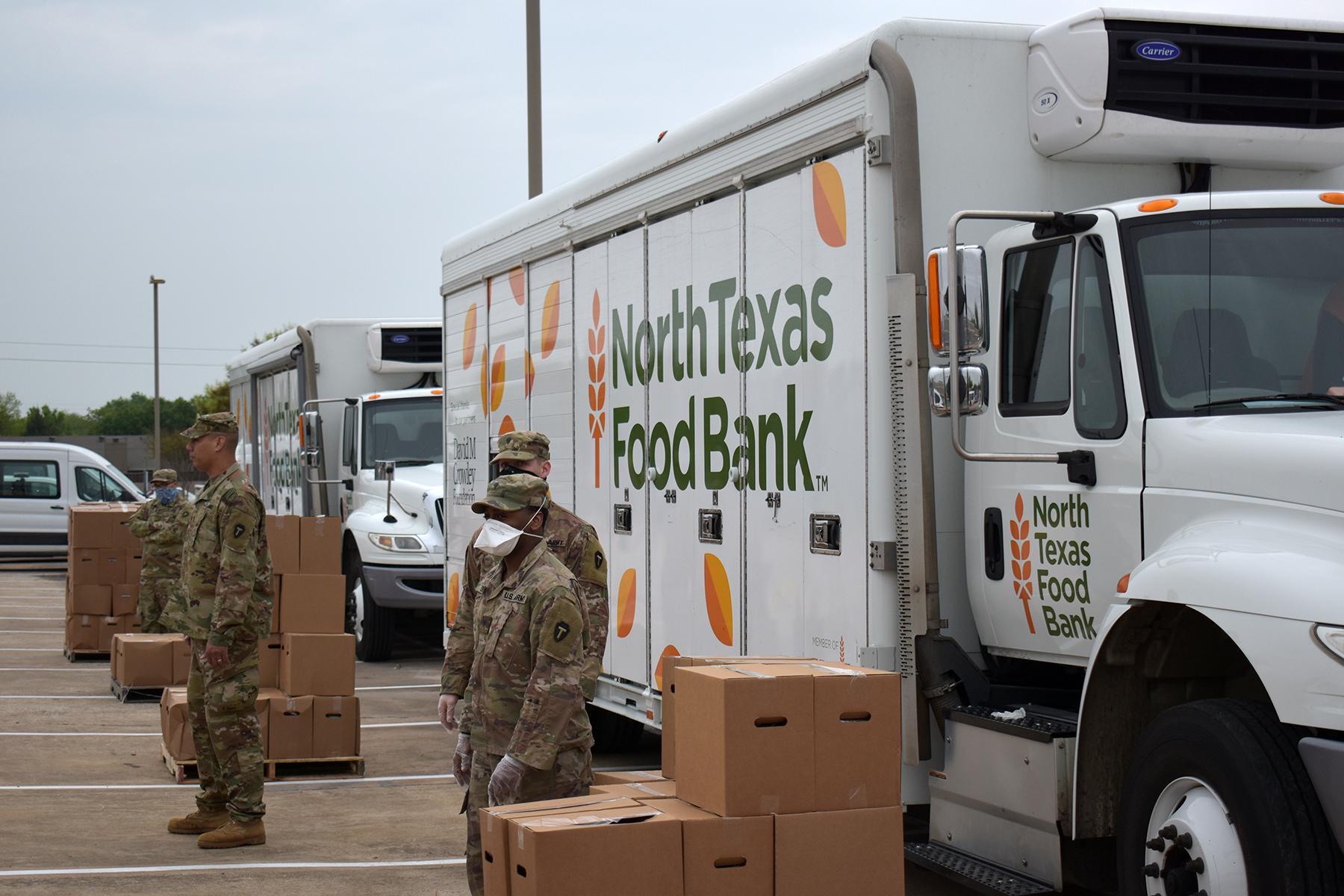The parking lot at Bowman Middle School in Plano looked like classes had just let out. A line of cars snaked hundreds of yards past the entrance and around the block, waiting for their chance to have a 27-pound box of nonperishable food loaded into their vehicles.
Public health experts have ordered “nonessential” businesses to close to slow the spread of coronavirus. It’s a sudden challenge for thousands of North Texans who suddenly find themselves reloading the state unemployment website and frequenting food bank drives like this one.
Few of those who came to Plano on Monday morning said they had enough saved to cover rent, healthcare, and food for more than one month. So they are here, accepting the boxes from Texas National Guardsmen at the North Texas Food Bank’s mobile pantry.
“I lost both my jobs I was working because of [coronavirus],” Mandy L. confides while waiting in line; she wasn’t comfortable providing her last name. Few who spoke to D for this story were. She was a bartender and worked in retail and this is her first time at a food pantry. “It was just kind of sprung on me. Like, you know, zero time to prepare for something like this. Because I don’t have anything in savings, so, it just kind of catches you off guard basically. So, it’s just been a whirlwind. Kind of like you’re in a dream.”
“I have five roommates and all but one of us have been affected by this—only one of us still has a job,” Mandy says. “We have this month taken care of, thankfully. As for next month, I have no idea.”
She was not alone. Maria Martinez worked in human resources management. Nancy Estupinan, whose husband worked in apartment maintenance. Daisy M., a Richland College sophomore. They also were waiting in line. All lost their jobs – and have spouses, siblings, parents who lost jobs – because of coronavirus. None had used food pantries before the spread of COVID-19 pushed so many of us inside.
A surge of these first-time comers, many who lost their hourly job and face the brunt of the coronavirus economic blight, has caused a huge spike in demand at food pantries across Dallas-Fort Worth.
“At a typical distribution [before coronavirus], we can do anywhere between 200 and 300 families,” says Dr. Valerie Hawthorne, the director of government relations at NTFB. “We are doing distributions now in the 800 to 1,500 range.” From 9 a.m. to 11 a.m., at Bowman, the Guardsmen handed out nearly 1,250 boxes—almost 34,000 pounds of food. They ran out and had to turn people away.
You see the same thing in other parts of town. In southern Dallas, Crossroads Community Services food pantry has seen a 290 percent increase in total clients and about a 1,200 percent increase in new clients. It’s the same predicament in West Dallas at Voice of Hope Ministries.
“In a month I would serve maybe 60 to 80 [clients]—now I’m serving 180 a week,” says Debbie Solis, Voice of Hope’s director of family and community service. That’s a 900 to 1,200 percent demand increase. Ninety percent are new.
“This community is the working poor. So, now they’re not working. Now they’re just poor,” Solis says. “Most of the people here worked in either restaurants, or they worked in hotels.” Such as Courtney C., who worked at a large international hotel chain. Now she’s out of work, using a food pantry for the first time.
“On the 26th [of March] they sent us out an announcement that, ‘Because of the closures of the hotels, and because of the fact that there’s hours between calls, at this time we’re going to have to furlough you guys,’” Courtney says, waiting for food at Voice of Hope. “The entire reservations area where we worked was let go.”
Individuals from industries other than hospitality are also suffering. Maria Valderas, who came to the United States in 2008 and lives in West Dallas, worked in marketing. Her husband was in construction. Then her office closed. She lost her job. Her husband lost his job. Now she, too, is using a food pantry for the first time.
“And the problem is that we don’t have social security,” Valderas explains, in Spanish, to Solis. Her family is undocumented. “So, we’re not going to qualify for federal aid. No unemployment. Those of us who don’t have social security can’t get federal aid.”
“We have lots of milk,” Solis tells her later. “Quieren más que dos leches?”
“Si,” Valderas replies.
“They have four kids!” Solis yells at her staff. “Dale más leche! Give them all that we can!”
Yet even as Solis shares the milk, the demand spike has made food pantries pause for consideration. Voice of Hope blew through $1,000 worth of meat in three hours on Friday. They need more food and more money, she says. But their donations have stopped. “Even people that have money are scared.” So that she’s grateful that NTFB has waived its service and processing fees. And as for NTFB itself?
“The thing is, is that we are a food bank,” Dr. Hawthorne says. “So, we have a bank of reserves. So, we are using those resources right now. However, it’s rapidly depleting, so, that has been our plea to the community—that to continue a level of service that’s necessary now, we really need food and funds.”
“We are relying on the generosity of North Texas to keep us going,” she says.
Public health experts have ordered “nonessential” businesses to close to slow the spread of coronavirus. It’s a sudden challenge for thousands of North Texans who suddenly find themselves reloading the state unemployment website and frequenting food bank drives like this one.
Few of those who came to Plano on Monday morning said they had enough saved to cover rent, healthcare, and food for more than one month. So they are here, accepting the boxes from Texas National Guardsmen at the North Texas Food Bank’s mobile pantry.
“I lost both my jobs I was working because of [coronavirus],” Mandy L. confides while waiting in line; she wasn’t comfortable providing her last name. Few who spoke to D for this story were. She was a bartender and worked in retail and this is her first time at a food pantry. “It was just kind of sprung on me. Like, you know, zero time to prepare for something like this. Because I don’t have anything in savings, so, it just kind of catches you off guard basically. So, it’s just been a whirlwind. Kind of like you’re in a dream.”
“I have five roommates and all but one of us have been affected by this—only one of us still has a job,” Mandy says. “We have this month taken care of, thankfully. As for next month, I have no idea.”
She was not alone. Maria Martinez worked in human resources management. Nancy Estupinan, whose husband worked in apartment maintenance. Daisy M., a Richland College sophomore. They also were waiting in line. All lost their jobs – and have spouses, siblings, parents who lost jobs – because of coronavirus. None had used food pantries before the spread of COVID-19 pushed so many of us inside.
A surge of these first-time comers, many who lost their hourly job and face the brunt of the coronavirus economic blight, has caused a huge spike in demand at food pantries across Dallas-Fort Worth.
“At a typical distribution [before coronavirus], we can do anywhere between 200 and 300 families,” says Dr. Valerie Hawthorne, the director of government relations at NTFB. “We are doing distributions now in the 800 to 1,500 range.” From 9 a.m. to 11 a.m., at Bowman, the Guardsmen handed out nearly 1,250 boxes—almost 34,000 pounds of food. They ran out and had to turn people away.
You see the same thing in other parts of town. In southern Dallas, Crossroads Community Services food pantry has seen a 290 percent increase in total clients and about a 1,200 percent increase in new clients. It’s the same predicament in West Dallas at Voice of Hope Ministries.
“In a month I would serve maybe 60 to 80 [clients]—now I’m serving 180 a week,” says Debbie Solis, Voice of Hope’s director of family and community service. That’s a 900 to 1,200 percent demand increase. Ninety percent are new.
“This community is the working poor. So, now they’re not working. Now they’re just poor,” Solis says. “Most of the people here worked in either restaurants, or they worked in hotels.” Such as Courtney C., who worked at a large international hotel chain. Now she’s out of work, using a food pantry for the first time.
“On the 26th [of March] they sent us out an announcement that, ‘Because of the closures of the hotels, and because of the fact that there’s hours between calls, at this time we’re going to have to furlough you guys,’” Courtney says, waiting for food at Voice of Hope. “The entire reservations area where we worked was let go.”
Individuals from industries other than hospitality are also suffering. Maria Valderas, who came to the United States in 2008 and lives in West Dallas, worked in marketing. Her husband was in construction. Then her office closed. She lost her job. Her husband lost his job. Now she, too, is using a food pantry for the first time.
“And the problem is that we don’t have social security,” Valderas explains, in Spanish, to Solis. Her family is undocumented. “So, we’re not going to qualify for federal aid. No unemployment. Those of us who don’t have social security can’t get federal aid.”
“We have lots of milk,” Solis tells her later. “Quieren más que dos leches?”
“Si,” Valderas replies.
“They have four kids!” Solis yells at her staff. “Dale más leche! Give them all that we can!”
Yet even as Solis shares the milk, the demand spike has made food pantries pause for consideration. Voice of Hope blew through $1,000 worth of meat in three hours on Friday. They need more food and more money, she says. But their donations have stopped. “Even people that have money are scared.” So that she’s grateful that NTFB has waived its service and processing fees. And as for NTFB itself?
“The thing is, is that we are a food bank,” Dr. Hawthorne says. “So, we have a bank of reserves. So, we are using those resources right now. However, it’s rapidly depleting, so, that has been our plea to the community—that to continue a level of service that’s necessary now, we really need food and funds.”
“We are relying on the generosity of North Texas to keep us going,” she says.
Get the D Brief Newsletter
Dallas’ most important news stories of the week, delivered to your inbox each Sunday.





